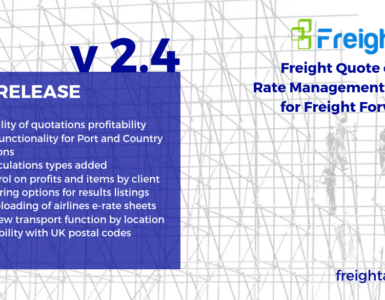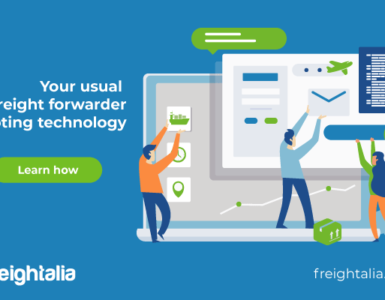Recently, several freight marketplaces have been born, such as Freightos, Sea Rates or Transporteca, which justifying a need for transparency and modernization in the sector intend to develop an Expedia, Trivago or Agoda for the freight.
The idea is that freight forwarders from all over the world upload their rates to the marketplace and when an exporter or importer requests a quotation on the website of the marketplace, they obtain a list of results showing the type of transport, transit time, shipping company or airline and of course, the price.
In general, this model is based on charging a commission for each booking achieved through the platform. In a sector where prices and margins are already very tight, commissions of between 2-5% may have a negative impact on the sales (if prices are to be raised) or margins (if the price is maintained and the commission is assumed).
But how is the added value offered by a professional freight forwarder quoted on a global portal? When choosing a hotel room, it is clear that it is not the same to stay at a downtown hotel or a secluded hotel. It is not the same to stay at a hotel of a famous chain or at an independent hotel. It is not the same a room with a view or a room with a jacuzzi. There are many factors that can differentiate a hotel or other in a long list of results for your next vacation.
But if the factors that are taken into account for the price of an export are the route, the liner and the transit time, it seems that the only factor of decision will be the price. How can the freight forwarding company quote for its services and their added value in a marketplace? The freight forwarder does not usually quote for their added knowledge and dedication but these are their weapons to win the sale and retain customers. But in a marketplace the customer is controlled by the marketplace itself, not the freight forwarder.
It is indisputable that the freight forwarder is the figure that acts as a bridge between all parties, airlines and shipping companies, exporters and importers, agents at origin and destination, customs, port authorities, inspection entities, insurers, etc. It is the one that gets lumbered with the responsibility, the one that responds with its liability to the parties, and the one that bears the extended terms of credit between the liner and the customer (exporter or importer).
This brings us to another fundamental consideration. Shippers look for and demand comfortable payment terms, usually 30 to 60 days, even more. The implementation of these marketplaces in the sector would also change significantly the rules of the game and global financing traffic since they propose that bookings are paid in cash. At present, only a small percentage of the traffic of a freight forwarder is charged upfront, for example for personal goods, for first shipments or operations with countries at greater risk.
At the moment, the large companies, like DAMCO, DHL, C.H. ROBINSON, KHUNE & NAGEL, DB SCHENKER, rather than participating in market places seem to bet on their own online sales and management platforms. They have recently launched Twill Logistics (DAMCO), Saloodo! (DHL), Freight Quote (CH ROBINSON), Kuehne + Nagel, and uShip (DB SCHENKER) for that purpose.
The independent freight forwarder must not forget the reason for its existence, which is its differentiation, the close relationship with clients, and the local knowledge. Despite the giants of the sector, the independent has maintained its position and market share based on its proximity and absolute dedication. For its customers, logistics and transportation are key and prefer to have a professional close to find the best solutions and solve incidents directly. Now their customers demand faster services and bigger technological capability, which must be incorporated into a successful and necessary business that helps many importers and exporters to sleep better every night. Thank you freight forwarders for moving the world every day.




